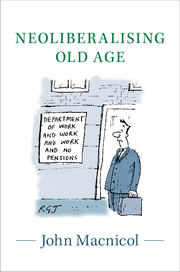7 - Towards age equality?
Published online by Cambridge University Press: 05 November 2015
Summary
To what extent are people discriminated against on grounds of age? This is a question that has been central to the discipline of gerontology ever since its first, hesitant beginnings over 100 years ago. Gerontologists have long argued that older people tend to be devalued in advanced industrial societies, for reasons that may be psychological, social, cultural or economic. They maintain that ageism is as virulent, corrosive and socially damaging as racism or sexism – and all the more so because it manifests itself in ways that are subtle or disguised. Anti-ageism has thus been an integral part of the growth of a rights-based, anti-discrimination culture in western societies since the 1960s, which in turn is associated with the emergence of new social movements and a distinct kind of identity politics. In the UK, age discrimination in employment was broadly made illegal under the 2006 Employment Equality (Age) Regulations and mandatory retirement has been effectively abolished (unless ‘objectively justified’). Politically, the culmination of this growing interest to date has perhaps been the assigning of the year 2012 as the European Union ‘Year of Active Ageing and Solidarity Between Generations’. It would seem that the rights of older people are finally being recognised.
Combating ageism raises the issue that is central to this book: the tension between, on the one hand, the ideal of an ‘ageless’ society, in which age would not be used as a basis for social judgements, and, on the other, the need to defend old age as a specially protected stage of life. An integral part of the social democratic compromise with neoliber-alism – best represented by New Labour when in government between 1997 and 2010 – has been the strategy of removing the ‘discriminatory’ barriers to active labour market participation and redefining economic and labour market problems as cultural, attitudinal and prejudice-based. Anti-ageism has therefore been a legitimating principle behind the labour market activation of older people. It has formed part of a portfolio of justifying arguments – demographic pressures, fiscal constraints, improved health and longevity, social justice – in support of raising state pension ages. Hence legislation against age discrimination in employment was seen by the Turner Commission as an essential part of the strategy of raising state pension ages.
- Type
- Chapter
- Information
- Neoliberalising Old Age , pp. 171 - 201Publisher: Cambridge University PressPrint publication year: 2015



